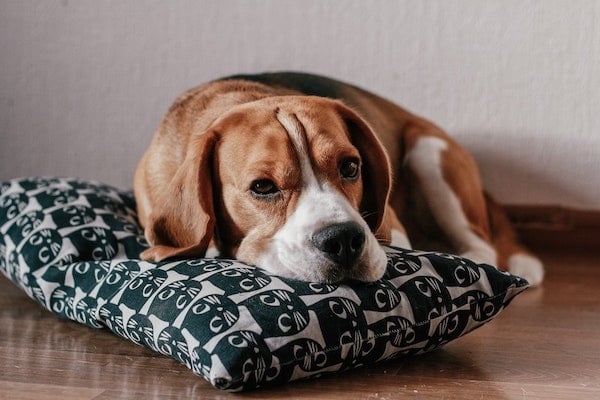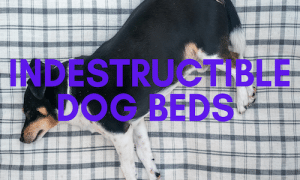A lot of owners have had the experience of parting a decent sum of money for a new dog bed only to see their furry friend destroy it almost as soon as they are able to or soon after. It’s an infuriating experience not only because of the money but also at the sheer frustration that your dog is doing something detrimental to themselves.
It seems like sheer stupidity or extreme rudeness for your dog to destroy something that should bring them comfort and a good night’s sleep. You may even watch them do it with a face full of rage (both of you) – chewing, shaking their heads, clawing as if their sleeping area is their mortal enemy.

Anyway, if you’re here it’s because you want an answer to the mystery around your dog destroying his bed. We’ve got several. Our Jug Dog Jeff used to try and destroy his bedding when he was younger so we’ve got some experience of the causes which made him do it as well as some curated research on reasons why other dogs may do this.
As with anything, the reason why YOUR dog does it is a mystery to us and only you know what makes your dog tick so please take this article as a guide if you will to help you decide what to do next – our first recommendation would be to purchase an indestructible dog bed!
Dogs like to chew things
To a dog, chewing is an enjoyable pastime and they will likely to try and chew everything before being taught not to. It’s almost like a natural instinct for many breeds to chew and destroy objects to keep themselves entertained if there’s nothing else going on.
If during puppyhood you allowed your dog to chew objects that weren’t specially made to be chewed such as toys then this behaviour will simply continue and perhaps worsen when they reach adolescence and adulthood.
Dogs do get bored of the same toys over time and they will leap at the chance to chew something pristine and untouched – such as a new bed. They won’t make the connection between the bed and a comfortable night’s sleep for themselves.
To remedy this, train your dog that chewing on a dog bed is an undesirable thing to do. If they begin chewing the bed let them know with a firm ‘no!’ and take the bed away. Repeat until they stop and if they don’t start giving them time outs for 30 seconds in an empty room. It may take some time but with enough conviction and a positive attitude it can be done.
Teething Puppy
If the destructive bed destroyer in question is a puppy then there’s a pretty good chance they’re teething and are taking it out on the bed. Soft, plushy material feels quite good to rip apart and can really distract them from the discomfort.
This is the perfect time to enforce positive reinforcement training and let them know chewing on a bed is not on but chewing on a toy is fine. There’s no better time to get rid of this behaviour than during puppyhood.
Boredom
If your dog doesn’t have something to keep them busy then many won’t just lay there and wait they will go out and find something to chew on to pass the time – their dog bed could be first in line. Dogs may seem like lazy and chilled out animals most of the time but they suffer from boredom just like the rest of us.
If they’re bored at home they may try and get your attention and whine before moving on to destructive behaviours such as destroying beds and any other object that takes their fancy. The worst behaviour can come from dogs who are alone and bored.
Remedying boredom can be done by providing them with plenty of appropriate toys on rotation so they never get bored of them and ensuring that they are getting enough exercise so that they may enjoy a bit of a nap instead of waiting around.
Anxiety and stress
Stress and anxiety in dogs can often lead to destructive behaviour such as bed chewing. The cause of your dog’s stress and anxiety (which includes separation anxiety) will only really be known to you as you know what they’ve been through and what they’re going through.
If you notice sudden bed destruction in your dog then it’s time to evaluate everything that’s going on – have there been any sudden life changes like moving house? Have they recently lost a fellow animal? Have you changed their diet lately?
Dogs who have come from rescue centres with a history of abuse are often bedding destroyers as they have past traumas which can be alleviated sometimes with a bit of destroying.
Separation Anxiety and stress in dogs is complicated due to not being able to communicate with them but once you see the symptoms there are plenty of steps you can take to reduce the stress such as exercise, switching up their diet, providing them with tougher toys to cope with their chewing and of course a firm but a fair bit of training.
Natural instinct
Dogs are born in nest-like situations in the wild and in the domestic situation (if they are crated) and as such are naturally inclined to want to dig and claw at their bed to leave the scent there (covered in why do dogs scratch at their beds). A new bed has no scent and they want to ensure no one else comes anywhere near it.
Second, some hunting breeds are natural diggers and this instinct kicks in with beds quite often (not exclusively though, they will dig just about anything). If you spot your dog digging but not chewing and throwing the bed around with their mouth then this might be the cause. Even more likely if you have any of the following breeds:
- Jack Russell Terrier (and crossbreeds of it)
- Daschund
- Siberian Husky
- Fox Terrier
- Beagle
- Border Collie
If you have any of these breeds find a way to get them a chew proof dog bed.
Lack of training
If you’ve never properly trained a dog to be obedient and not destroy dog beds they will continue to exhibit this behaviour every day until they’re told otherwise. One day you’ll need to admit that your dog needs training properly and that destruction is not ok where it’s a dog bed, toys or anything else they chew.
Positive reinforcement and redirection is our recommended path – whenever they start to wreck a dog bed give them something else instead to work on. If they keep going back to it then start to introduce time outs in a room with nothing in it. As soon as they do something desirable make sure to reward them with something they really love.
Your dog needs exercise
Every dog needs some form of daily exercise, we recommend at least 30 minutes of active walking – we would not count using chew toys as proper exercise. A dog not getting any or enough exercise and able to expel pent up energy will look at other ways to blow off some steam with dog beds right at the top of the list.
Conclusion
Chewing a bed to the point of destruction is very annoying and no one wants it to continue. There are plenty of reasons why dogs would do this as well as ways to stop it. We would always start by making sure they are getting enough exercise and are on a good diet before restarting to beginning a firm training schedule – this is a sure way to get them to stop and help them become more obedient at the same time.
Related Articles




